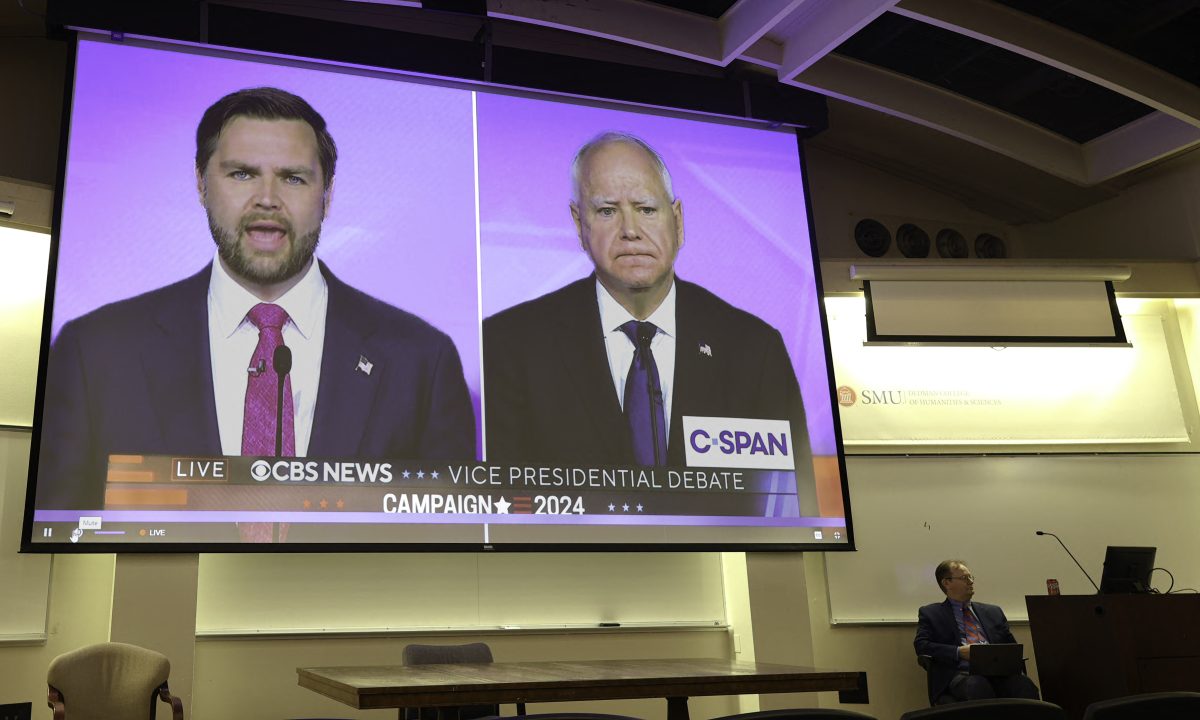It was almost like a grave, 2 feet below the ground and 5-by-5 feet wide, with walls of dark black dirt.
“It was damp and musky – I was in awe of being in the dirty little rat hole where Saddam was hiding, ” said Jason Jones, an army corporal who served in Iraq and is also an SMU student.
Jones is in his second year at SMU and is pursuing a degree in business management and economics at the Cox School of Business. He maintains a 3.87 GPA in hopes that he can one day attend graduate school at Harvard and become a politician.
This 23-year-old army corporal served on the Army Intelligence Team that went inside the infamous hole where Saddam Hussein, the former leader of Iraq, was captured.
Jones’ team gathered the information on Hussein’s location from the base and directed forces to move in to capture Hussein on Dec. 13, 2003.
“Through interrogation of a high level Saddam supporter, we were able to gather information,” Jones said.
Jones said he found it comical that Hussein urged all of his followers to fight until their death, and he came crawling out of a hole in Ad Dwar, Iraq to surrender.
Two years after his capture Hussein stands trial. Jones now feels his efforts have been justified.
“Seeing Saddam stand trial in a now democratic nation is justification for all of the soldiers’ efforts and sacrifices,” he said.
Jones is living the life of a college student, spending most of his time studying.
“It’s rare to see someone go to school and do so well after they have been in the army,” friend and SMU journalism major Julie LoCascio said.
Jones ended his four years of service in August 2004. He remains in the army reserve while trying to build a life in Dallas.
He is extremely involved in campus life with the SMU Wakeboarding Club. He has been the president of The Society of Success and Leadership and was chairman of the L.E.A.D. Leadership Certificate Program.
He is also an avid aquarium enthusiast. He has a 40-gallon salt-water tank, with two shrimp, two fish and over 40 pieces of coral that he has raised himself.
“I like it, because I am playing God to this little world,” Jones said.
Following the war, Jones has had to deal with more strife upon his return to the States. His father, his hero, is fighting a battle with liver cancer. Jones’ relationship with his family is extremely important to him.
“He is a big brother. He is his father’s best friend. He is someone we can all lean on and talk to,” his mother, Debbie Jones, said.
Jones said he has seen army friends get injured or even killed, but it’s even more traumatic watching his father suffer.
Jones also said his father now spends most of his time in a La-Z-Boy chair in the family’s Dallas home, because that’s where he feels most comfortable.
“He has lost a lot of friends in the war, and because of that he truly sees the value of life like no one else,” LoCascio said.
Jones graduated from Lake Dallas High School at 17 and decided to join the army. His parents had always been supportive, but it was his motivation to be the best that drove him to serve his country.
“We have raised him to make his own decisions and accept them and all the consequences that follow,” D. Jones said.
Jones joined the Army in 2000 not expecting to go to war. Jones said he wasn’t ready to go straight to college, so he figured the Army could help him develop some essential life skills.
The turning point in Jones’ life came the day he left for basic training at Fort Jackson, S.C.
“I was by myself, I could rarely call home, I couldn’t lean on anyone, it was just me and my whole life before me,” Jones said. He said basic training was one of the most difficult tasks of his life.
“They break you down mentally and then build you up as a team,” he said.
Jones completed basic training with high honors, being named “Soldier Leader of the Cycle.”
Jones was stationed in Fort Huachuca, Ariz., finishing Army Intelligence training when he learned the news of 9/11.
“The base was locked down for a couple of days. We didn’t know what was going to happen and everyone was in shock,” Army friend Patrick Mueller said.
Reality hit and Jones began preparing for war. He went through rigorous physical activities.
“I trained my body to push beyond limits I thought I had,” he said.
In April of 2003, Jones was shipped off to Iraq. “I felt a whole range of emotions: scared, proud and the fear of the unknown,” he said.
He was stationed in Tikrit, Iraq. Jones slept in a cot in one of Hussein’s palaces. During the first month, he was allowed one liter of water a day for bathing, laundry and drinking while temperatures reached 120 degrees. He lived on packaged processed foods and drove around Iraq looking for roadside bombs.
“Jason served directly under the commanding officer. He would work for 12 to 18 hours straight,” Mueller said. “All you had time to do was work and sleep.”
Most importantly, his intelligence team would gather information about Hussein’s whereabouts. The information extended to facts like where he grew up, who had cut his hair and who had been his friends’ friends. They created a comprehensive web of over 400 names of people that Hussein had been associated with.
Jones and his platoon were based two miles away from the farm where Hussein was hiding. When they got word of where Hussein had been hiding, a group of 600 soldiers moved in for the capture. They looked all over the farm but couldn’t find any signs of Hussein.
Jones’ team was sure of the location and ordered the soldiers to keep looking. Finally, in the middle of the field, underneath a mat, was the hole where they had found Hussein.








